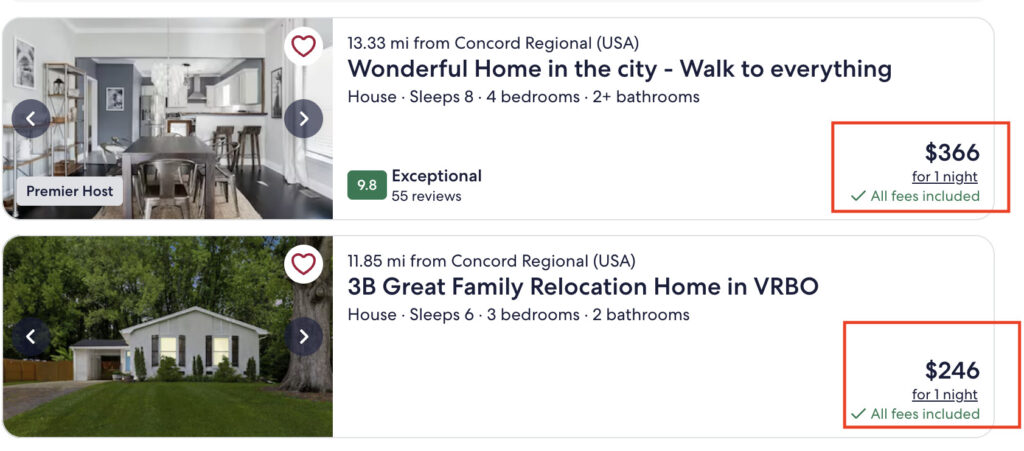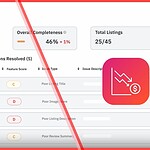With new U.S. regulations coming into force on May 12, 2025, Booking.com and Vrbo have joined Airbnb in displaying total prices upfront, marking a major milestone in the short-term rental industry’s shift toward transparency.
What began as compliance in Europe has now become a global norm: the three biggest OTAs now all display the total accommodation price, including cleaning and service fees, upfront at the start of the guest search journey. While Airbnb got ahead of the curve globally, Booking.com and Vrbo are the latest to extend this experience to U.S. travelers, aligning with the FTC’s new “Junk Fees” rule.
Here’s what property managers need to know about how we got here, and what it means going forward.
Booking.com Adds Total Price Display for U.S. Travelers
To comply with the Federal Trade Commission’s (FTC) new “Junk Fees” rule, Booking.com updated its U.S. systems on May 12, 2025, to ensure that the total price, including all mandatory fees, is shown upfront to American users. This rule applies to short-term rentals, hotels, and other accommodations marketed to U.S. consumers, regardless of where the business is based. It prohibits “drip pricing,” where extra charges are only revealed late in the booking process.
While Booking.com has long displayed total prices in European markets, this update reflects a renewed focus on price enforcement in the U.S. With changes to its Demand API, hosts and property managers must now provide detailed fee information through structured fields in their PMS or integration. This ensures a more consistent and transparent pricing display across listings, especially in regions where compliance is now legally required.

This Isn’t New for Booking.com in Europe
In Europe and the UK, Booking.com has long adhered to total price display requirements, largely due to regulatory pressure from the European Commission and the UK’s Competition and Markets Authority (CMA).
In 2019, Booking.com and other Online Travel Agents (OTAs) entered binding agreements with the CMA, agreeing to show the full cost of a stay, including unavoidable fees, at the start of the booking process.
(At the time, the UK was still part of the European Union, and the CMA’s enforcement aligned closely with the EU’s Unfair Commercial Practices Directive.)
This was enforced under the UK’s Unfair Trading Regulations.
Vrbo: Also Global, with Enforceable Rules
Vrbo has enforced a global pricing transparency policy effective May 12, 2025, marking a shift to mandatory structured data input. According to its updated Partner-Collected Fees & Taxes Policy, all mandatory fixed fees must be disclosed and shown as part of the upfront price. This includes cleaning fees, resort access, and any other compulsory charges.
- Partners must enter these fees into structured fields—not bury them in property descriptions, so Vrbo can consistently display accurate total pricing across listings.
- Hosts may not charge undisclosed fees; violations can lead to account suspension or removal.
- Taxes may still be collected separately but must be disclosed before payment.
Traveler-facing experience: Vrbo now shows the total price (excluding taxes) early in the search flow alongside nightly rates, allowing users to make informed comparisons.

Airbnb: Global Transparency Since April 2025
Airbnb made total price display the default globally in April 2025. This change ensures guests see the full cost (excluding taxes) from the start. Additionally, Airbnb’s updated Off-Platform Policy requires hosts to either bundle all fees or clearly itemize them for accurate pricing.
Airbnb was the first major platform to bring full price transparency to the U.S. market proactively. Prior to the FTC mandate, Airbnb already displayed the total price upfront by default, positioning itself as a leader in pricing clarity for American guests.
A Consistent Front Across Platforms
With Airbnb, Vrbo, and now Booking.com displaying total prices upfront, the industry has reached a tipping point. Transparent pricing is no longer a differentiator, it’s the standard. Across all major OTAs:
- Platform parity is increasing.
- Pricing discrepancies between listings become more obvious to travelers.
- Property managers must carefully consider how their fees impact conversion and guest trust.
The technical ability to display total prices has existed for years, but the enforcement of standardized data input from hosts represents a notable step toward operationalizing transparency across all listings.
What’s New in the UK: STRs Now Explicitly Included
In April 2024, the CMA issued an updated version of its “Unfair Commercial Practices Guidance,” expanding the scope of total price transparency rules to short-term rental platforms and marketplaces, not just hotels and OTAs.
Key points from the CMA update:
- Total price must include all compulsory charges (e.g. cleaning, admin, resort access fees).
- This total must be shown at the beginning of the customer journey.
- Optional services and government-imposed taxes may be listed separately but must be disclosed clearly before payment.
This move clarifies that STRs are not exempt and signals increased scrutiny of how fees are presented across booking platforms.
What’s Driving This Shift?
The convergence on total price display is the result of several overlapping forces:
- Consumer frustration, especially in the U.S., around “junk fees”—often cleaning or service fees—that are revealed late in the booking journey.
- Regulatory pressure from agencies like the FTC and UK CMA, who’ve made it clear that “drip pricing” is an unfair commercial practice.
- Marketplace competition among platforms, which incentivizes aligning with the clearest and most guest-friendly experiences.
As a result platforms are aligning on a shared pricing standard, not just because they’re required to, but because guest trust and conversion depend on it.
What began with backlash against hidden cleaning fees has evolved into a full regulatory and reputational imperative. Platforms now compete not only on features and reach, but on trust and fairness.
Why It Matters for Property Managers
With Airbnb, Vrbo, and Booking.com now aligned on price transparency:
- Guests will be able to compare listings more easily.
- Properties with high cleaning or service fees may face lower conversions.
- Platform compliance could affect listing visibility or ranking.
- Direct booking websites may also face pressure to match OTA standards, especially in the U.S. and UK.
This is not just a regulatory checkbox. It’s a trust-building measure and a competitive factor.
Transparency Is No Longer Optional
The FTC rule has catalyzed a broader shift across the short-term rental industry. With Booking.com updating U.S. pricing, and Airbnb and Vrbo already compliant globally, total price display is becoming the baseline expectation.
In the UK, the CMA’s updated guidance ensures that short-term rentals are no longer in a grey zone. All platforms must now offer pricing that is not only legal but guest-friendly. For managers, it’s time to reassess your fee structures, pricing strategies, and owner communications to thrive in this new era of transparency.
Uvika Wahi is the Editor at RSU by PriceLabs, where she leads news coverage and analysis for professional short-term rental managers. She writes on Airbnb, Booking.com, Vrbo, regulations, and industry trends, helping managers make informed business decisions. Uvika also presents at global industry events such as SCALE, VITUR, and Direct Booking Success Summit.








